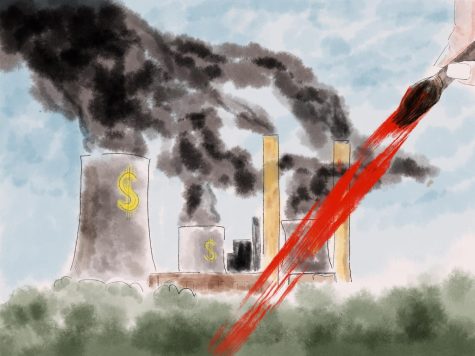Capitalism or Earth: An ultimatum
February 24, 2022

If there is one thing that is absolutely evident, it is that we need to take immediate action to save our planet.
At the end of 2021, political leaders from around the world met in Glasgow, Scotland, for the 26th United Nations Climate Change conference (COP26) to discuss the climate crisis and how their respective capitalist countries were going to fix it.
Many nations made statements about their promise to protect the environment. President Biden even made a commitment to reducing greenhouse gas emissions and having a net-zero economy in the United States by 2050.
However, these promises were vague and hollow. This becomes even more evident when considering Biden’s 85-car motorcade that he used to visit the Pope in Rome on that same trip and the 118 private jets that were used in total to attend the conference, burning over 1,000 tons of carbon dioxide in the process. That is hardly a sign of leaders that actually care about protecting the environment.
This hypocrisy is not just some simple mistake, but rather it is representative of a much larger truth: Capitalism cannot, and will not, stop climate change.
Capitalism as a system relies on unlimited and infinite economic growth. The slightest downturn in economic progress causes it to almost completely collapse. We saw this at the beginning of the COVID-19 pandemic, when just a few weeks of reduced progress and workers staying home forced the market to some of its lowest points since the Great Depression.
In order to avoid total destruction, capitalism has to be constantly growing and using the planet’s resources. Michael Parenti, in his book ‘Blackshirts and Reds,’ states that “the essence of capitalism… is to convert nature into commodities and commodities into capital, transforming the living earth into inanimate wealth.”
But a system that relies on infinite growth and resources simply cannot coexist with a planet that has a very finite number of resources; resources that are necessary for survival. According to Parenti, “[capitalism] treats the planet’s life sustaining resources… as dispensable ingredients of limitless supply, to be consumed or toxified at will.”
As these vital resources are depleted, the climate crisis is only worsened. The burning of fossil fuels adds more carbon dioxide to the atmosphere, and the process of rapid deforestation prevents that CO2 from being absorbed. This process creates the ‘greenhouse effect,’ which only serves to increase global warming.
This process of depletion also opens the window for more environmental disasters. Just in 2021 there were six oil spills, dumping about 10,000 metric tons of oil altogether. While the average number of oil spills per year has decreased since 1970, these spills do serious damage to the environment that can last a long time. The Deepwater Horizon spill of 2010 that occurred off the coast of Louisiana released over 130 million gallons of oil into the Gulf of Mexico. Over a decade later, many of the animals in that region continue to feel the effects of it.
So what of the promises made in Glasgow and the many promises our own president has made? Simply put, they are all empty.
Every commitment made by these countries serves as a band-aid, which allows their leaders to reassure the people that the problem is being solved, while at the same time doing nothing to help or continuing to allow more damage to be done to the environment. Barely a month after COP26, the U.S. Department of the Interior reversed a pause on lease sales to oil companies, offering leases on over 80 million acres in the Gulf of Mexico.
This should come as no surprise. Capitalism and the many governments that represent it will always prioritize profit over the well-being of the people and the planet. In ‘Translating Anarchy’, author Mark Bray states that “capitalism only respects the environment when it is profitable or compelled to do so.”
Often people will point to ‘green capitalism’ as a solution. This idea emphasizes personal responsibility, telling people that the reason climate change is a problem is because we use plastic straws and don’t bring our own bags to the grocery store. This is not necessarily a problem, and we should absolutely stop using so much plastic, but this idea only serves to distract from the real issue that is capitalism as a whole.
According to Parenti, emphasizing personal responsibility propagates “the myth that the ecological crisis we face is a matter of irrational individual behavior rather than being of a social magnitude,” and that “the problem is not individual choice but the system that imposes itself on individuals and prefigures their choice.”
Like the promises that world leaders can make about climate change, green capitalism allows companies to absolve themselves of responsibility and act like they are making a difference. But any advancement that green capitalism creates is only temporary and will be immediately overturned when it is no longer profitable.
There is another entire conversation to have about what the alternative to the current system is, but the simple truth is that to protect the planet and the millions of species that rely on its resources for survival, capitalism must go.

























































































